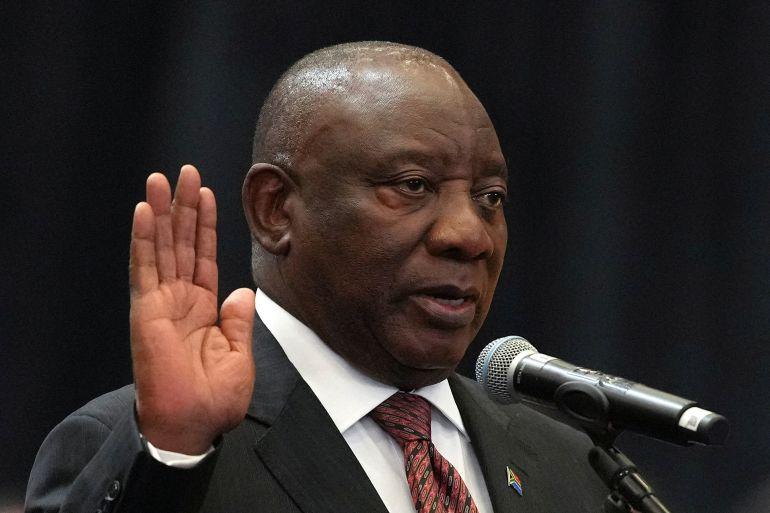Source: ALJAZEERA
ALJAZEERA MEDIA NETWORK

Former adversaries unite as the ANC seeks to extend its 30-year reign, backing Cyril Ramaphosa for a second term.
Cyril Ramaphosa is set to be re-elected as the president of South Africa after the African National Congress (ANC) leader received backing from the country’s second largest party following a coalition agreement.
The ANC, which has ruled since 1994 after fighting against apartheid, lost its majority for the first time in last month's election and has since engaged in intense negotiations with other political parties.
As the newly elected parliament assembled on Friday, Democratic Alliance (DA) leader John Steenhuisen announced that his main opposition party, led predominantly by white members, had formalized a governing pact with the ANC, which would support Ramaphosa's presidency.
"We will be supporting President Cyril Ramaphosa in his bid for the presidency of the Republic of South Africa," Steenhuisen stated during a recess in parliament's opening session.
With lawmakers expected to elect a president later in the day, the ANC and DA combined hold a majority, which would secure the 71-year-old Ramaphosa a second term. In the May 29 polls, the ANC secured 40 percent of the votes while the DA received 21 percent.
Additionally, two smaller parties—the socially conservative Inkatha Freedom Party and the right-wing Patriotic Alliance—will also join the coalition government.
On Friday, ANC Secretary-General Fikile Mbalula mentioned that most political parties in South Africa agreed on a national unity government. He indicated that the structure of this unity government would be revealed when Ramaphosa made his announcement.
![Jacob Zuma greets supporters in Soweto on May 18 [Jerome Delay/AP Photo]](https://nowtrends.net/storage/2024/06/UHLQL3FK1KDO_QS60DTOIU8ZI.jpg) Jacob Zuma greets supporters in Soweto on May 18 [Jerome Delay/AP Photo]
Jacob Zuma greets supporters in Soweto on May 18 [Jerome Delay/AP Photo]
If Ramaphosa remains the sole nominee, he automatically secures re-election; however, if other parties put forward candidates, an election will take place.
This coalition agreement signifies a new chapter in South Africa's political scene, which has been dominated by the ANC since its 1994 electoral victory that ended apartheid.
"Today represents the dawn of a new era where we set aside our differences to improve the lives of all South Africans," noted Sihle Zikalala, an ANC governance member, in a post on X.
Political analyst Ayesha Kajee, speaking from Johannesburg, suggested that the Economic Freedom Fighters (EFF) and other smaller parties would likely join the government. She noted that the DA and ANC are "ideologically almost diametrically opposed."
"The ANC has chosen not to form a coalition with the DA, EFF, or small party consortiums. Instead, they are creating a national unity government similar to the first democratically elected government in 1994," Kajee told Al Jazeera.
"This move brings several small parties into government. However, this will involve negotiations over key roles, especially cabinet and ministerial positions in the new government. The DA and EFF are expected to have strong preferences for certain key portfolios, but it's uncertain if the ANC will cede these roles after holding power for so long."
The ANC also faces a timeframe to finalize a coalition agreement as parliament must convene and vote for the president within 14 days of the election results announcement, with the deadline being Sunday.
Friday's parliamentary session is anticipated to be lengthy, beginning with the election of a speaker and deputy speaker before voting for the president.
The MK Party, affiliated with former ANC leader and South African President Jacob Zuma, has declared it will boycott the inaugural session, with its 58 lawmakers abstaining.
This is unlikely to disrupt the voting process as South Africa's constitution requires only one-third of the 400 lawmakers to be present for a quorum and vote. The ANC alone holds more than one-third of the seats.
South Africa hasn’t experienced such political uncertainty since the ANC came to power in 1994, ending almost fifty years of white minority rule under apartheid.
Ever since elections for president were mere formalities given the ANC’s strong majority, all South African leaders since 1994 have been from the ANC, starting with Nelson Mandela.
Parliament convenes in an unusual venue due to a 2022 fire that damaged the National Assembly building in Cape Town. Lawmakers will select their next leader at a conference center near the city’s waterfront.
Your email address will not be published. Required fields are marked *